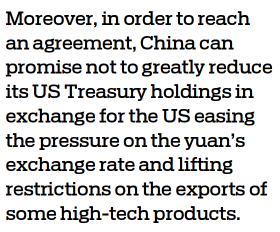Cooperation can help Washington build for the future


The $1.2 trillion infrastructure bill the United States Senate approved on Aug 10 after months of deliberation constitutes the biggest investment in infrastructure, including roads, bridges, railways, ports, power grids and broadband, since the 1950s.
Most of the transportation and power generation and supply networks in the US were built in the 1960s or even earlier. No wonder the Joe Biden administration has made infrastructure development an important political agenda.
Given China's expertise and rich experience in developing modern infrastructure and the US' need to improve its infrastructure, Washington could work in cooperation with Beijing to modernize its crumbling infrastructure.
Infrastructure upgrading in the US in cooperation with China will boost the economic development of not only the US and China but also the rest of the world. It will also prompt Chinese enterprises to take up similar projects in other countries, and encourage Chinese investors to invest in diverse projects in the US. Also, Sino-US cooperation in infrastructure construction will boost the economic integration of the two countries and help them to work toward a bilateral investment treaty.
Trade played a big role in improving overall Sino-US relations. So China should establish a mechanism to benefit from US infrastructure projects, especially since it has also gained a lot of experience in infrastructure management and become a leader in innovative technologies.
The improvement of Sino-US ties will boost not only the two countries' social development, but also global trade and investment. As many Chinese enterprises would like to help the US revitalize its crumbling infrastructure, China ought to hold talks with the US to share its experience in infrastructure design, construction, technologies and quality maintenance.
Sino-US cooperation in infrastructure will also serve the common interests of the two countries, and further integration of the world's two largest economies will enhance their political mutual trust and people-to-people exchanges. And Chinese enterprises that are invited to take part in the US' infrastructure projects will get the opportunity to better understand international rules and sharpen their competitiveness in the global market.
More important, Sino-US cooperation in infrastructure will help defuse the tensions between the two countries, while easing the financial pressure on the US, boosting employment in the country and reducing its trade deficit with China.
China-US cooperation can help improve the world order, too. The Sino-US trade conflicts and Washington's Indo-Pacific strategy have soured bilateral ties. So the two sides should try to improve bilateral ties through open, transparent and efficient economic exchanges, by first resolving their trade disputes and then addressing other issues.
Besides, China should communicate with the US to adopt a debt-to-equity swap plan to provide funds for infrastructure projects. While the US can sell a few shares or issue government bonds to raise money, China can use US Treasury securities it holds to invest in infrastructure projects, and boost the exports of its products, even if it means receiving dividends years later. In fact, the transformation of US Treasury securities into investment can benefit both countries.
For China, the plan can help raise the yield of US Treasury bills, notes and bonds, and promote innovation. And for the US, it can help revitalize its infrastructure, facilitate its re-industrialization and reduce its debt stress.
Moreover, in order to reach an agreement, China can promise not to greatly reduce its US Treasury holdings in exchange for the US easing the pressure on the yuan's exchange rate and lifting restrictions on the exports of some high-tech products.
The further depreciation of the US dollar in 2021 has lowered the value of US Treasury securities held by China. Therefore, China needs to adjust its investment policy and adopt flexible measures, by establishing new mechanisms to transform funds into capital, and investing in US infrastructure projects is one way of doing that.

The views don't necessarily reflect those of China Daily.
Liu Weiping is a researcher at China Development Bank and a professor of economics at Wuhan University; and Liu Bowen is a research associate at the School of Economics and Management, De Montfort University.
If you have a specific expertise, or would like to share your thought about our stories, then send us your writings at opinion@chinadaily.com.cn, and comment@chinadaily.com.cn.

































